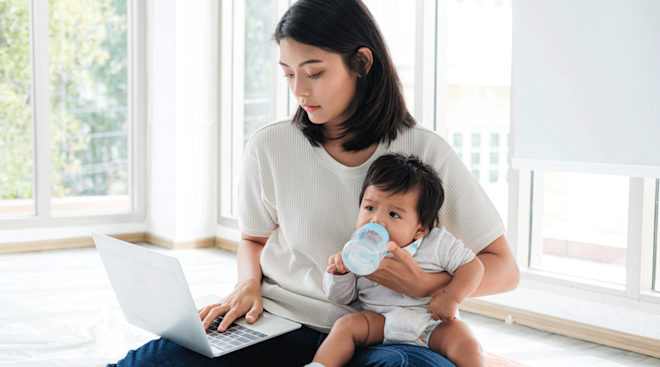New Report Explores if Remote Work Is Really Working for Parents
There have been many changes since the coronavirus outbreak, but perhaps the biggest one has been around how we work. America, in particular, has experienced a remote work revolution. Before 2020, nearly two-thirds of Americans said they rarely or never worked from home. Now, 66 percent are able to work from home in some capacity.
While this massive shift is undeniable and most likely here to stay, there are still plenty of unanswered questions about remote work—especially its impact and effectiveness for caregivers. To get some clarity, childcare resource Care.com and work-life benefits platform Mother Honestly teamed up to answer three main questions:
- How does remote work impact the lives of caregivers?
- How does it affect their careers?
- How has the change affected women, who make up three-quarters of all caregivers?
The report surveyed 1,000 employee caregivers and 500 managers to see what they had to say. Read on for their answers.
How does remote work impact the lives of caregivers?
The bottom line—remote or hybrid workers are happier, more fulfilled employees. This happiness extends beyond just the caregiver to their families too. Objectively remote work saves employees an enormous amount of time.
More than 65 percent of employees say they save an hour or more by skipping their commute. That comes out to almost 15 days a year! And parents aren’t using this time frivolously–73 percent spend it with their kids, 70 percent spend it with their partner, and 63 percent use it to catch up on much-needed rest.
Some other interesting findings from the report include:
- Over 75 percent of employees say remote work improves their overall quality of life, and 77 percent of their managers agree.
- Employees report that hybrid work results in greater overall happiness (56 percent vs. 22 percent in-office full-time)
- Workers are also less stressed (54 percent vs. 24% percent), report a better work-life balance (49 percent vs. 27 percent), and experience more career fulfillment (46 percent vs. 29 percent).
How does it affect their careers?
Employee productivity when working from home is often an employer’s primary concern—one that has kept many from enjoying a flexible workplace for years. But as many already know, this simply isn’t true for many.
Fifty-five percent of employees say they’re more productive working remotely, and 58 percent of managers agree. In fact, 46 percent of employees say they work more hours remotely, and 50 percent of their managers agree. A remote or hybrid workplace isn’t just good for caregivers; it’s good for business too.
How has the change affected women?
Given all the hardships mothers have endured since the pandemic, remote work, could be one of the small wins for women in the workplace. Over 75 percent of men and women employees say remote work has created a more even playing field for career advancement across gender lines.
That being said, the report is quick to note that employers must handle remote work right, or it could actually lead to career setbacks. Workplace experts warn that “proximity bias”—the tendency for in-person managers to favor in-person employees over remote ones—could disadvantage people who work from home more often. This is in line with the 58 percent of women and 64 percent of men who say remote work limits their career advancement.
So, is remote work working for caregivers?
Overwhelming, the answer seemed to be yes. The report confirms what many caregivers already knew—that remote work enables employees to excel at all aspects of their lives, both as workers and as caregivers, driving productivity and overall happiness.
That being said, working from home isn’t always a walk in the park. If you’re a parent, check out these tips on how to work from home with kids, as well as our favorite free resources to help keep kids entertained.
Navigate forward to interact with the calendar and select a date. Press the question mark key to get the keyboard shortcuts for changing dates.





















































